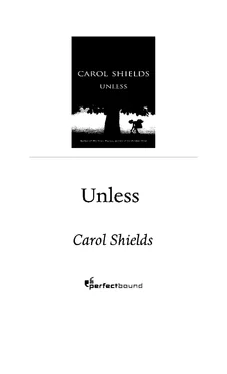Carol Shields - Unless
Здесь есть возможность читать онлайн «Carol Shields - Unless» — ознакомительный отрывок электронной книги совершенно бесплатно, а после прочтения отрывка купить полную версию. В некоторых случаях можно слушать аудио, скачать через торрент в формате fb2 и присутствует краткое содержание. Жанр: Современная проза, на английском языке. Описание произведения, (предисловие) а так же отзывы посетителей доступны на портале библиотеки ЛибКат.
- Название:Unless
- Автор:
- Жанр:
- Год:неизвестен
- ISBN:нет данных
- Рейтинг книги:4 / 5. Голосов: 1
-
Избранное:Добавить в избранное
- Отзывы:
-
Ваша оценка:
- 80
- 1
- 2
- 3
- 4
- 5
Unless: краткое содержание, описание и аннотация
Предлагаем к чтению аннотацию, описание, краткое содержание или предисловие (зависит от того, что написал сам автор книги «Unless»). Если вы не нашли необходимую информацию о книге — напишите в комментариях, мы постараемся отыскать её.
Unless — читать онлайн ознакомительный отрывок
Ниже представлен текст книги, разбитый по страницам. Система сохранения места последней прочитанной страницы, позволяет с удобством читать онлайн бесплатно книгу «Unless», без необходимости каждый раз заново искать на чём Вы остановились. Поставьте закладку, и сможете в любой момент перейти на страницу, на которой закончили чтение.
Интервал:
Закладка:
“What a terrible life she’s had!” Sally said.
“No,” I insisted, “she’s had a remarkably satisfying life.”
“It’s not as though she hates men,” Lynn put in.
“Far from it.”
“Which wouldn’t surprise anyone,” Annette said. “If she did hate men, I mean.”
“It’s only,” I said, hesitating, not wanting to speak for Danielle, “that she probably hoped for the big step forward. Not all these little legislative steps that hardly add up.”
Annette and Lynn nodded at this, but Sally looked baffled. “My God,” she said. “Just having a washer and dryer is progress. Just having running water. You’ve been to Africa.
You’ve seen women who do nothing all day but carry jugs of water.”
Sally doesn’t get it. I’m not sure Lynn does either. Annette does, I think. Maybe because she’s black as well as female.
Annette nods slowly. “I know.” “The misery!”
It is Tuesday morning, January 2 in the year 2001. I have phoned Mr. Springer’s office in New York and left a surprisingly assertive message, saying that I would not be available until the fifth of January, a Friday. Tuesdays I have coffee with my friends in the Orange Blossom Tea Room and Wednesdays I drive to Toronto; I didn’t bother to explain the particulars to Adrienne, the secretary, but she phoned me straight back to say that Arthur had acquiesced.
He could not manage the fifth but would definitely arrive on Friday the nineteenth, and that he would turn up on my doorstep at three in the afternoon and was looking forward to a country weekend.
“A country weekend?” Lynn Kelly said in her musing way. “What do you suppose he has in mind? Horses and things?”
“I suppose I could have a dinner party,” I said. “But I really can’t be bothered.”
“A rustic dinner party?”
“A potluck thing?”
“You could take him to the Saturday-morning market. It’s got much better lately. There’s a woman who makes beads out of dried rose petals —”
“Yes! And they’re supposed to have everlasting fragrance. She has some way of compacting them.”
“That’s what the original rosaries were made of —”
“Really! I never put that together.”
“And there’s that man who makes those outrageous twig chairs that —”
“That you can’t actually sit down on.”
“They’re sculpture, in his view, not furniture. And there’s someone new, he’s got hair down to his waist, who takes chunks of wood and installs little secret drawers in them, and inside the drawers are other little drawers.”
“What do you think he’ll be like?” Sally asks. “Your Arthur Springer with his —”
“I don’t know,” I confess. “But I’m terribly afraid he’s going to be — I can’t pin it down exactly, but —”
“New Agey?”
“New Yorky.”
“Cool type? Ivy covered?”
I shake my head. “I’m afraid he’s going to be smarmy.”
“Oh, my God.”
“Don’t let him get away with it.”
“Just smarm him back.”
“Pompously mandarin, like those —”
“I’ll have to ask him to stay to dinner, and I have a feeling Tom’s going to be driven up the wall. The girls too. They’re formidable. They have this new word: kronk. It means shit or something like that. Kronk you, they say to each other. They call Tom the Kronkmeister, and he loves it. He does a little salute and clicks his heels. Natalie does these wicked imitations of
—”
“Leave it to a teenager to see through genuine smarm —”
“Especially New York smarm. Or kronk, for that matter. When we were there —”
“I’ve talked to him on the phone twice now, and I couldn’t help noticing that he always interrupts me just when I’m getting to the point of —”
“We’re always interrupting each other. Have you noticed how we, the four of us —”
“That’s different. It’s all right to interrupt each other when there’s no power structure to —
”
“Really? Do you really believe that —?”
“It’s how the conversation goes, how it gets made, brick by brick, but with these little chipped-in bits of —”
“But you and Arthur What’s-his-name are definitely in a power arrangement, Reta.”
“This man’s your publisher.”
“No, he’s her editor, not her publisher.”
“But he can decide what is going to be published, what is acceptable to the —”
“He can definitely influence Reta’s novel.”
“If you let him.”
“At least you’ll be on home turf. They always say with football that the home field has a definite —”
“You know, Reta, the very fact that he was ‘unable’ to come on the fifth as you suggested and changed to the nineteenth —”
“Definitely signals a power play.”
“Absolutely.”
“The final say.”
“I’ve done it myself.”
“How is it coming, Reta? The novel?”
“Slowly. I’ve slowed down a bit.”
“The pressure from New York can’t help. And so soon after Christmas when it’s all we can do to gear up again.”
“You’re right. Just the thought of him makes me terribly self-conscious. The more he praises, the more doubtful I become.”
This is true. I haven’t looked at the manuscript for a couple of days. Before hearing from Arthur Springer it had been my darling baby, my greatest distraction. The only efficient way I had to palliate my worry about Norah was to melt into an alternative reality, to hie myself downtown to Wychwood City with its financial district and concert hall and statues and street corners and its luminous puzzles of space. And now I’m frightened by it, afraid to click on the icon for Thyme in Bloom. Instead I’ve been brushing up on trombones, astonished to find a sizable weblio-graphy on the subject. Trombones look idiotically simple, but in fact they’re the subject of legend and romance, even greatness. Another distraction. I think about these brass instruments the way I look into the dregs of a coffee cup, idly, tipping it so that the circle at the bottom of the cup widens to an oval lake. There is so much to know.
Meanwhile, the novel is frozen by its own core of procrastination. Alicia is still trying to decide what she can do to save herself. She doesn’t want to hurt Roman, her dear Roman with his thick rumpled head of hair and musky scent, like a wedge of cheese crusted over. But she must tell him soon what he long ago should have understood. Her mother will wail, her father will grouch, and Roman’s family will think ill of her, everyone will be embarrassed. But she must secure her own survival. Yet that sounds selfish. She wants out of the engagement but she also wants to live with a good conscience. Surely there is some kind of ethical judgment she can draw on. Everywhere on this earth there exist lovers who dissolve their commitments; it’s scarcely a crime. Alicia knows she and Roman will survive, but she — she will be the destroyer, the breaker of promises, hard-hearted, unkind, bringing corrosion and damage to an existence that has been underpinned with natural goodness. Love, marriage, children, a nest in which to nestle. The comfort of it, the natural curvature to which we cling.
Whenever Alicia thinks of idealized goodness, the image of granite comes to mind, polished surfaces, impermeable stone. But stone can be crushed, rather easily, in fact. Alicia has visited the quarry down near Straw Hill. She’s seen the giant machines at work. Goodness is not guaranteed. A life of principle requires practice, and although a lot of contractual morality has been worked out, people continue to make mistakes. Then goodness becomes simply a matter of what we wanted to do all along. Whatever is convenient. Face it, goodness has no force; none. Decadence and transgression and overturned promises do occur, all the time, in fact. She’s tried to describe her feelings to Roman, but he is occupied with other issues.
Читать дальшеИнтервал:
Закладка:
Похожие книги на «Unless»
Представляем Вашему вниманию похожие книги на «Unless» списком для выбора. Мы отобрали схожую по названию и смыслу литературу в надежде предоставить читателям больше вариантов отыскать новые, интересные, ещё непрочитанные произведения.
Обсуждение, отзывы о книге «Unless» и просто собственные мнения читателей. Оставьте ваши комментарии, напишите, что Вы думаете о произведении, его смысле или главных героях. Укажите что конкретно понравилось, а что нет, и почему Вы так считаете.












